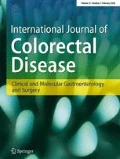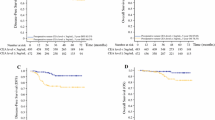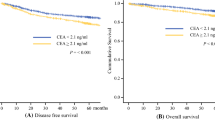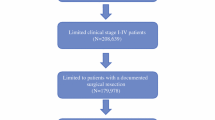Abstract
Purpose
This study aimed to clarify the significance of preoperative serum carcinoembryonic antigen (CEA) on disease-free survival (DFS) in colon cancer and propose a new prognostic grouping system.
Methods
A multiinstitutional retrospective cohort of 7296 colon cancer patients who underwent R0 surgery between 1997 and 2006 was analyzed. We stratified preoperative serum CEA values into three categories (C-stages): C0 (normal CEA), C1A (up to double the cutoff value), and C1B (more than double the cutoff value) and stratified each TNM stage by C-stage. Multivariate analyses using Cox regression models were used to analyze the significance of C-stage on 5-year DFS.
Results
CEA level was an independent factor affecting DFS; the 5-year DFS of patients with C0 and C1, as well as those with C1A and C1B, differed significantly (C0 84.6%, C1 69.8%, C1A 72.7%, and C1B 66.4%, P < 0.0001). Additionally, the DFS of pStages IIC and C1B was significantly lower than of pStages IIIA and C0 (65.8 vs. 87.7%, respectively; hazard ratio 3.44, 95% confidence interval 1.97–5.88, P < 0.0001). Moreover, the 5-year DFS of pStages IIIA and C0 or C1A did not differ significantly from pStages I and C1A (87.7 vs. 87.7%, P = 0.90 and 86.4 vs. 87.7%, P = 0.78, respectively).
Conclusions
pStage IIC and C1B disease should be considered candidates for intensive adjuvant chemotherapy. Conversely, pStages IIIA and C0 or C1A could be exempted from adjuvant chemotherapy. Incorporating C-stage into the current TNM staging system may facilitate decision making regarding the use of adjuvant chemotherapy in colon cancer patients.


Similar content being viewed by others
References
Ferlay J, Soerjomataram I, Dikshit R, Eser S, Mathers C, Rebelo M, Parkin DM, Forman D, Bray F (2015) Cancer incidence and mortality worldwide: sources, methods and major patterns in GLOBOCAN 2012. Int J Cancer 136(5):E359–E386. doi:10.1002/ijc.29210
Sobin LH, Gospodarowicz M, Wittekind C. (2009) TNM classification of malignant tumors. UICC International Union Against Cancer. Seventh Edition. Wiley-Black Well
Wanebo HJ, Rao B, Pinsky CM, Hoffman RG, Stearns M, Schwartz MK, Oettgen HF (1978) Preoperative carcinoembryonic antigen level as a prognostic indicator in colorectal cancer. N Engl J Med 299(9):448–451. doi:10.1056/NEJM197808312990904
Wolmark N, Fisher B, Wieand HS, Henry RS, Lerner H, Legault-Poisson S, Deckers PJ, Dimitrov N, Gordon PH, Jochimsen P et al (1984) The prognostic significance of preoperative carcinoembryonic antigen levels in colorectal cancer. Results from NSABP (National Surgical Adjuvant Breast and Bowel Project) clinical trials. Ann Surg 199(4):375–382
Onetto M, Paganuzzi M, Secco GB, Fardelli R, Santi F, Rovida S, Ferrara GB (1985) Preoperative carcinoembryonic antigen and prognosis in patients with colorectal cancer. Biomed Pharmacother 39(7):392–395
Scott NA, Wieand HS, Moertel CG, Cha SS, Beart RW, Lieber MM (1987) Colorectal cancer. Dukes’ stage, tumor site, preoperative plasma CEA level, and patient prognosis related to tumor DNA ploidy pattern. Arch Surg 122(12):1375–1379
Wiggers T, Arends JW, Volovics A (1988) Regression analysis of prognostic factors in colorectal cancer after curative resections. Dis Colon rectum 31(1):33–41
Meling GI, Rognum TO, Clausen OP, Børmer O, Lunde OC, Schlichting E, Grüner OP, Hognestad J, Trondsen E, Havig O et al (1992) Serum carcinoembryonic antigen in relation to survival, DNA ploidy pattern, and recurrent disease in 406 colorectal carcinoma patients. Scand J Gastroenterol 27(12):1061–1068
Slentz K, Senagore A, Hibbert J, Mazier WP, Talbott TM (1994) Can preoperative and postoperative CEA predict survival after colon cancer resection? Am Surg 60(7):528–531
Lindmark G, Bergström R, Påhlman L, Glimelius B (1995) The association of preoperative serum tumour markers with Dukes’ stage and survival in colorectal cancer. Br J Cancer 71(5):1090–1094
Harrison LE, Guillem JG, Paty P, Cohen AM (1997) Preoperative carcinoembryonic antigen predicts outcomes in node-negative colon cancer patients: a multivariate analysis of 572 patients. J Am Coll Surg 185(1):55–59
Compton C, Fenoglio-Preiser CM, Pettigrew N, Fielding LP (2000) American Joint Committee on Cancer Prognostic Factors Consensus Conference: Colorectal Working Group. Cancer 88(7):1739–1757
Locker GY, Hamilton S, Harris J, Jessup JM, Kemeny N, Macdonald JS, Somerfield MR, Hayes DF, Bast RC Jr, ASCO (2006) ASCO 2006 update of recommendations for the use of tumor markers in gastrointestinal cancer. J Clin Oncol 24(33):5313–5327. doi:10.1200/JCO.2006.08.2644
Duffy MJ, van Dalen A, Haglund C, Hansson L, Holinski-Feder E, Klapdor R, Lamerz R, Peltomaki P, Sturgeon C, Topolcan O (2007) Tumour markers in colorectal cancer: European Group on Tumour Markers (EGTM) guidelines for clinical use. Eur J Cancer 43(9):1348–1360
Park IJ, Kim HC, Yu CS, Yoo JH, Kim JC (2005) Cutoff values of preoperative s-CEA levels for predicting survivals after curative resection of colorectal cancer. J Korean Med Sci 20(4):624–627. doi:10.3346/jkms.2005.20.4.624
Thirunavukarasu P, Sukumar S, Sathaiah M, Mahan M, Pragatheeshwar KD, Pingpank JF, Zeh H 3rd, Bartels CJ, Lee KK, Bartlett DL (2011) C-stage in colon cancer: implications of carcinoembryonic antigen biomarker in staging, prognosis, and management. J Natl Cancer Inst 103(8):689–697. doi:10.1093/jnci/djr078
Thirunavukarasu P, Talati C, Munjal S, Attwood K, Edge SB, Francescutti V (2015) Effect of incorporation of pretreatment serum carcinoembryonic antigen levels into AJCC staging for colon cancer on 5-year survival. JAMA Surg 150(8):747–755. doi:10.1001/jamasurg
Kim CG, Ahn JB, Jung M, Beom SH, Heo SJ, Kim JH, Kim YJ, Kim NK, Min BS, Koom WS, Kim H, Roh YH, Ma BG, Shin SJ. (2016) Preoperative serum carcinoembryonic antigen level as a prognostic factor for recurrence and survival after curative resection followed by adjuvant chemotherapy in stage III colon cancer. Ann Surg Oncol. Oct 3. doi:10.1245/s10434-016-5613-5
Becerra AZ, Probst CP, Tejani MA, Aquina CT, González MG, Hensley BJ, Noyes K, Monson JR, Fleming FJ (2016) Evaluating the prognostic role of elevated preoperative carcinoembryonic antigen levels in colon cancer patients: results from the National Cancer Database. Ann Surg Oncol 23(5):1554–1561. doi:10.1245/s10434-015-5014-1
Japanese Society for Cancer of the Colon and Rectum, Watanabe T, Itabashi M, Shimada Y, Tanaka S, Ito Y, Ajioka Y, Hamaguchi T, Hyodo I, Igarashi M, Ishida H, Ishiguro M, Kanemitsu Y, Kokudo N, Muro K, Ochiai A, Oguchi M, Ohkura Y, Saito Y, Sakai Y, Ueno H, Yoshino T, Fujimori T, Koinuma N, Morita T, Nishimura G, Sakata Y, Takahashi K, Takiuchi H, Tsuruta O, Yamaguchi T, Yoshida M, Yamaguchi N, Kotake K, Sugihara K (2012) JSCCR guidelines 2010 for the treatment of colorectal cancer. Int J Clin Oncol 17(1):1–29. doi:10.1007/s10147-011-0315-2
National Comprehensive Cancer Network. (2015) https://www.nccn.org/
Kim CW, Yoon YS, Park IJ, Lim SB, Yu CS, Kim JC (2013) Elevation of preoperative s-CEA concentration in stage IIA colorectal cancer can also be a high risk factor for stage II patients. Ann Surg Oncol 20(9):2914–2920. doi:10.1245/s10434-013-2919-4
Efficacy of adjuvant fluorouracil and folinic acid in colon cancer. International Multicentre Pooled Analysis of Colon Cancer Trials (IMPACT) investigators (1995) Lancet 345:939–944
Gill S, Loprinzi CL, Sargent DJ, Thomé SD, Alberts SR, Haller DG, Benedetti J, Francini G, Shepherd LE, Francois Seitz J, Labianca R, Chen W, Cha SS, Heldebrant MP, Goldberg RM (2004) Pooled analysis of fluorouracil-based adjuvant therapy for stage II and III colon cancer: who benefits and by how much? J Clin Oncol 22(10):1797–1806. doi:10.1200/JCO.2004.09.059
Figueredo A, Charette ML, Maroun J, Brouwers MC, Zuraw L (2004) Adjuvant therapy for stage II colon cancer: a systematic review from the Cancer Care Ontario Program in evidence-based care’s gastrointestinal cancer disease site group. J Clin Oncol 22(16):3395–3407. doi:10.1200/JCO.2004.03.087
Quasar Collaborative Group, Gray R, Barnwell J, Mc Conkey C, Hills RK, Williams NS, Kerr DJ (2007) Adjuvant chemotherapy versus observation in patients with colorectal cancer: a randomised study. Lancet 370:2020–2029. doi:10.1016/S0140-6736(07)61866-2
Chu QD, Zhou M, Medeiros KL, Peddi P, Kavanaugh M, Wu XC (2016) Poor survival in stage IIB/C (T4N0) compared to stage IIIA (T1-2 N1, T1N2a) colon cancer persists even after adjusting for adequate lymph nodes retrieved and receipt of adjuvant chemotherapy. BMC Cancer 16:460. doi:10.1186/s12885-016-2446-3
Acknowledgements
The authors completed this study in collaboration with the following: M. Watanabe (Kitasato University School of Medicine), I. Takemasa (Sapporo Medical University), K. Hakamada (Hirosaki University), H. Kameyama (Niigata University), Y. Takii (Niigata Cancer Center Hospital), K. Hase (National Defense Medical College), T. Watanabe (Tokyo University), K. Takahashi (Tokyo Metropolitan Cancer and Infectious Diseases Center Komagome Hospital), Y. Kanemitsu (National Cancer Center Hospital), M. Itabashi (Tokyo Women’s Medical University), H. Yano (National Center for Global Health and Medicine), M. Yasuno (Tokyo Medical and Dental University), H. Hasegawa (Keio University), Y. Hashiguchi (Teikyo University), T. Masaki (Kyorin University), K. Maeda (Fujita Health University), K. Komori (Aichi Cancer Center Hospital), Y. Sakai (Kyoto University), M. Ohue (Osaka Medical Center for Cancer and Cardiovascular Diseases), N. Tomita (Hyogo College of Medicine), and Y. Akagi (Kurume University).
Author information
Authors and Affiliations
Corresponding author
Ethics declarations
Ethical statement
Ethics approval was obtained from the Tochigi Cancer Center’s institutional review board, and for this type of study, formal consent is not required.
Conflict of interest
The authors declare that they have no conflict of interest.
Rights and permissions
About this article
Cite this article
Ozawa, H., Kotake, K., Hosaka, M. et al. Incorporation of serum carcinoembryonic antigen levels into the prognostic grouping system of colon cancer. Int J Colorectal Dis 32, 821–829 (2017). https://doi.org/10.1007/s00384-017-2772-1
Accepted:
Published:
Issue Date:
DOI: https://doi.org/10.1007/s00384-017-2772-1




